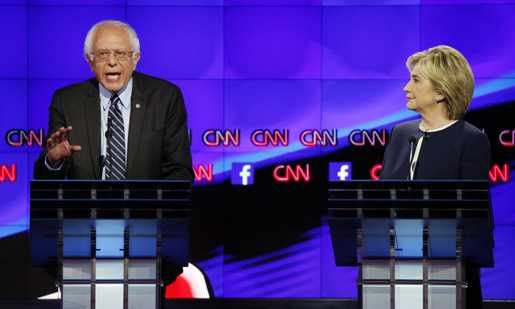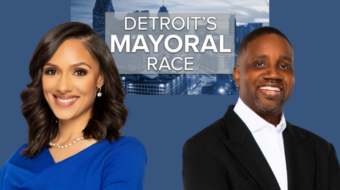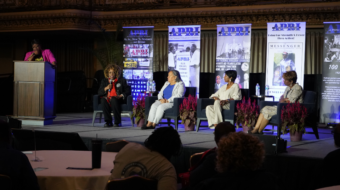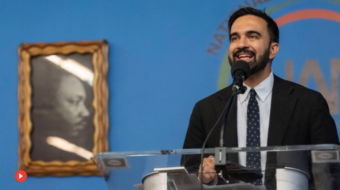
WASHINGTON – Democratic presidential hopefuls, particularly Hillary Clinton and Bernie Sanders, largely agree on major issues, ranging from labor law reform to rebuilding infrastructure to changing federal education law, their answers to an AFL-CIO questionnaire show. But they differ in emphasis and in details.
The questionnaires, posted in the Communications Workers website’s election survey of its members, went to every presidential hopeful in both parties. The four Democrats and Republican Mike Huckabee replied by the Sept. 15 deadline, a month before the first Democratic presidential debate, held in Las Vegas on Oct. 13.
CWA posted them, with links to each candidate’s home page, even of non-responders. It invited members to read everything before telling CWA whether – and whom – to back.
One Democrat, former Rhode Island Gov. Lincoln Chafee, did not respond to the AFL-CIO. Huckabee, the former Arkansas governor, was the sole Republican to reply, just as he was the sole Republican to speak to the AFL-CIO executive council in August.
Clinton, the former secretary of state, New York senator and U.S. First Lady, was the most general in her answers. The current front-runner in national Democratic polls, Clinton frequently promised to roll out more specifics in coming weeks.
For example, she supports rewriting labor law, but did not say how. “We need to strengthen unions’ ability to organize and collectively bargain. The great American middle class was built in large part by workers exercising their right to organize and bargain for higher wages and better conditions,” Clinton said.
“When more workers were in unions, more workers were in the middle class and their wages went up. And economists have said the decline in union density is a key factor in the rise in income inequality. When workers have a voice on the job, we are all better off.”
Her main challenger, Vermont’s Senator Sanders, an independent running in the Democratic primaries, was more specific. He used his answer to a question about preserving Social Security and traditional defined pension benefit plans to argue for labor law reform.
“The most important thing we can do to preserve and expand defined benefit pension plans is to make it easier for workers to join unions,” Sanders said. It’s “severely undermined.”
His solution – which he introduced as legislation on Oct. 6 – is to formally legalize card-check recognition when a petitioning union collects NLRB election authorization cards from a majority of workers at a workplace.
“This is not a radical idea,” said Sanders, a self-described democratic socialist. “Card check was the law of the land from 1941 to 1966.” He also supports strong penalties for labor law-breakers “during organizing and first contract drives” and reform to “make it easier…to negotiate a first contract.” He was not specific on what that reform would be. His bill calls for first-contract mediation, then mandatory arbitration if the two sides cannot agree on their own.
O’Malley, the former – and very pro-labor – Maryland governor, was also more specific. Besides the same reforms Sanders advocates, O’Malley would increase penalties for labor law-breaking firms and strengthen the National Labor Relations Board’s enforcement powers. O’Malley also would expand labor law to cover “alt-labor organizations, worker centers and collaborative labor-management models.”
Webb, the former Reagan Navy Secretary and Democratic senator from Virginia, touted his union card-holder credentials, reminded readers he supported the 1989 Mine Workers’ Pittston coal strike and added he walked union picket lines while running for senator in 2006.
He too advocated strengthening labor law, adding workers and unions should have guaranteed seats on corporate boards, as in Germany. “This in and of itself encourages a different viewpoint of organized labor, not as an enemy but as a partner in corporate growth.”
Huckabee was the dissenter on labor law. His state, Arkansas, passed the first so-called right-to-work law, in 1944, primarily to prevent African-Americans from empowering themselves by unionizing. He told the AFL-CIO that expanding the right to organize should be up to states.
“The president should foster a more cooperative and complementary relationship between labor and management,” Huckabee said in the questionnaire. “The president can help create a healthy and civil tone of respect towards labor and make clear that workers will be respected and treated with dignity not only in hiring, but in retention.”
And while the four Democrats support public sector collective bargaining, Huckabee said “each state should determine its own path” on that. He would let public workers join unions, but would ban the right to strike. One former GOP presidential hopeful, Wisconsin Gov. Scott Walker, made his war on public workers’ unions the center of his now-dead drive.
Consolidated replies on some of the other issues included:
● Including Huckabee, four of the five hopefuls – everyone but Clinton – opposed the proposed Trans-Pacific Partnership, and several opposed fast-track presidential trade promotion authority, too. In early October, however, Clinton announced she also opposes the TPP.
Workers and unions are vigorously campaigning against the TPP as the latest and worst in a 22-year string of ‘free trade’ pacts that lack worker rights and let multi-national firms export U.S. jobs overseas, driving down living standards and driving workers to unemployment.
“The TPP is much more than a ‘free trade’ agreement,” Sanders said. “It is part of an effort to boost profits for large multinational corporations and Wall Street by offshoring jobs, undercutting worker rights and dismantling labor, environmental, food safety, health and financial laws.
“We must fundamentally rewrite our trade policies. Our goal must be to ensure that American-made products, not American jobs, are our #1 export,” he declared.
● Four of the five hopefuls offered a mix of solutions for revitalizing the U.S. economy and directing more of its benefits to workers and the middle class. Their solutions included expanding infrastructure, investing in K-12 education and investing in clean energy.
Sanders also advocated raising the minimum wage to $15 an hour “over a period of years,” expanding eligibility for overtime pay to anyone earning $1,090 a week or less, gave strong support to the Paycheck Fairness Act and pay equity for working women and said he would fight for legislation to ban employer misclassification of workers as “independent contractors.” And he wants to expand Davis-Bacon and Service Contract Act prevailing wages.
O’Malley also favors raising the minimum wage to $15 and more overtime eligibility. He would raise money for economic revitalization through taxing financial transactions – a favorite cause of National Nurses United – and equal tax rates on capital gains and regular income.
Webb emphasized worker retraining and measures to aid the 25 percent of U.S. high school students who still do not graduate. He also added coal and nuclear energy to the investment mix, while Huckabee added coal.
The Arkansan was the odd man out on overall economic solutions, too, constantly returning to what he called The Fair Tax, and describing it as a national consumption (sales) tax that would replace the payroll tax and other taxes, and thus “empower” workers.
● Candidates agreed manufacturing must be revitalized, but disagreed how. Sanders touted investing in clean energy programs and plants, not including nuclear power, and said doing so could create thousands of factory jobs. Webb added nuclear to that investment mix.
Clinton advocated investing in infrastructure to help industry, enacting a new federal “advanced manufacturing” tax credit and “cracking down on loopholes that reward companies for shifting jobs and earnings overseas.”
O’Malley says he wants “a 100 percent clean energy economy by 2050” along with retrofits of all federal buildings, a continued ban on exports of U.S.-produced oil and gas, and “a federal cap on carbon emissions.”
● Clinton, Sanders and O’Malley all opposed channeling public dollars to private schools via vouchers. Webb was silent on the issue. Sanders and O’Malley also opposed tax credits for private school tuition. Vouchers and private school tax credits are key issues for the two teachers unions, AFT and NEA. Vouchers were one issue where Clinton was specific.
“I strongly oppose voucher schemes because they divert precious resources away from financially strapped public schools to private schools that are not subject to the same accountability standards or teacher quality standards. It would be harmful to our democracy if we dismantled our public school system through vouchers, and there is no evidence that doing so would improve outcomes for children,” she declared.
Republican Huckabee said “I believe in school choice so that parents in poverty can find the best educational option for their children,” a coded way of saying he backs vouchers.
● Clinton and Sanders criticized the 2001 No Child Left Behind law’s emphasis on teaching to the test. Webb was largely silent, using his education answer to concentrate on the high school dropouts. O’Malley emphasized channeling federal education funds to kids and schools that need it the most, and was also silent on teaching to the test.
● Three Democrats were vague on revising the Affordable Care Act and especially on the “Cadillac Tax,” scheduled to kick in starting in 2018, on high-cost health insurance plans. Huckabee said the Supreme Court “bailed out Congress” by approving the law.
Clinton would “re-examine the Cadillac tax and…change the tax code so it advances the interests of lower-income and middle-class workers.” O’Malley agreed. Webb was “amenable to revising” ACA portions “so it better serves needs of working Americans,” but said no more.
Sanders spent his health care section touting his favorite cause, government-run single-payer health insurance, labeled “Medicare for all.” But, realizing it wouldn’t be enacted soon, he was less sure about repealing the Cadillac tax, a top legislative goal of many unions.
The tax is part of ACA’s “balance of revenue and spending provisions that led to reduced cost to the federal government over time,” said Sanders. “To preserve those savings, we must ensure any changes to revenues, such as in the excise tax…are not made in such a way that they lead to reductions in subsidies in other areas, such as the health exchanges.”
● Sanders went into detail about his legislation to increase the profitability and save jobs at the U.S. Postal Service – a measure that postal unions, led by the Letter Carriers, strongly
support. His bill would repeal the congressionally imposed 10-year $5 billion yearly payment USPS must make to pre-fund 75 years of future retirees’ health care benefits. It also would let USPS expand into other lines of work, such as notarizing documents and postal banking.
Health care pre-funding dragged the Postal Service into the red and led the former postmaster general to close post offices, slow mail delivery, cut jobs and outsource work to low-paid non-union Staples employees. “We’ve been told all these horrendous cuts are necessary because the Postal Service is going broke. That is a lie,” Sanders declared.
O’Malley agreed with Sanders. Clinton would “ban contracting out” of postal jobs, but stopped there. Webb was silent. Huckabee said the Postal Service is doing a good job.
Photo: John Locher/AP










